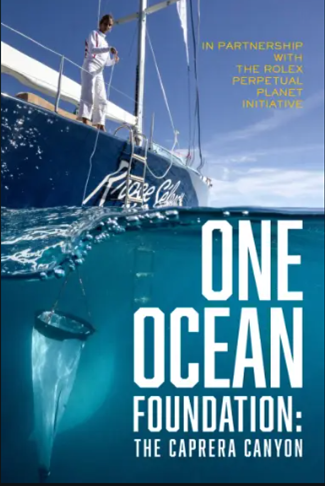One Ocean Foundation
Dedicated to Marine Environment Preservation
The waters of the Canyon of Caprera in the Mediterranean are home to a host of endangered species including whales, dolphins and monk seals. Researchers at One Ocean Foundation are using hydrophones and environmental DNA to understand the ecosystem. That knowledge is essential for the protection of the region. Watch the film on Water Bear, a new platform that brings inspiration and action together through award-winning, certified films and documentaries, here.

The “Business for Ocean Sustainability” project is promoted by the One Ocean Foundation (OOF), in collaboration with SDA Bocconi School of Management Sustainability Lab, McKinsey & Company and CSIC (Consejo Superior de Investigaciones Científicas) and aimed at building knowledge about the relationship between the business and the ocean.
The project started in 2019 with the goal of investigating the role of companies in addressing ocean challenges, focusing on the pressures on marine ecosystems, the level of awareness within the business community and the main (technological and organizational) responses implemented.
As a result, three main reports have been published and presented in international conferences and events, including participation in the World Ocean Day event organized by the United Nations on June 8, 2020.
The research has highlighted that, although disclosure frameworks on ESG issues are becoming more established, companies committed to ocean sustainability have limited opportunities to report their strategies and achievements against ocean-specific targets and KPIs. This is mainly due to a lack of reporting frameworks focused on ocean-related issues.
The Ocean Disclosure Initiative
The Ocean Disclosure Initiative has the ambition to be a science-based framework and methodology aimed at supporting businesses from all industries in taking action on ocean-related issues, promoting prevention and/or mitigation responses and favoring disclosure and reporting.
We are committed to develop the Ocean Disclosure Initiative addressing direct and indirect pressures by different business sectors on marine ecosystems. In order to raise awareness and promote the activation on ocean sustainability, a new initiative dedicated to standardizing a set of indicators and disclosing corporate information about ocean sustainability is needed.
Preserving the ocean is paramount, as it provides fundamental resources and ecosystem services that enables many activities that are vital for human well-being
Over 3 billion people (40% of the world’s population) depend on the biodiversity and services offered by marine and coastal ecosystems. The ocean supports unique habitats and contains somewhere between 500,000 and 10 million marine species, most of which are still unknown. Services provided by the ocean include food and fresh water supply, renewable energy, benefits for health and wellbeing, cultural value, tourism, trade, and transport, making a major contribution to our economic and social development.
Degradation in Marine and Coastal Ecosystems
Despite its relevance, in recent decades the degradation of marine and coastal ecosystems has quickly accelerated. Scientific evidence reports that the ocean has absorbed more than 90% of the excess heat in the climate system, constantly warming from 1970 onwards. Since 1993 the warming rate has more than doubled, while marine heatwaves have very likely doubled in frequency since 1982 and occur with an increased intensity. Moreover, with the absorption of higher quantities of atmospheric anthropogenic CO2, the ocean and the seas have undergone a process of increasing acidification. Based on multiple lines of evidence, ocean acidification and ocean deoxygenation will continue to increase in the 21st century, at rates dependent on future emissions. The World Meteorological Organization’s (WMO) Statement on the State of the Global Climate in 2019 confirms exceptionally high ocean and land temperatures over the past years, and a record rise in sea level, with a warming trend expected to continue.
Overfishing is widely acknowledged as the greatest single threat to biodiversity and marine wildlife and habitats. The Food and Agriculture Organization (FAO) reports that more than 60% of the world’s fish stocks are now fully fished, overfished or depleted. Among the 16 major statistical areas, the Mediterranean and Black Sea have the highest percentage (62%) of unsustainable fishing stocks, followed by the Southeast Pacific (61%) and Southwest Atlantic (59%).
Growth in population and in economic activities will drive additional and accelerating pressures on the marine and coastal environment. Negative consequences not only impact habitats and biodiversity, but also industries based on ecosystem services (e.g. fisheries, agriculture, tourism). The consequences are expected to affect coastal or ocean related activities, but also inland sectors, such as agriculture, infrastructures and services such as energy, transportation, and utilities. One Ocean Foundation: The Caprera Canyon
Learn more about One Ocean Foundation